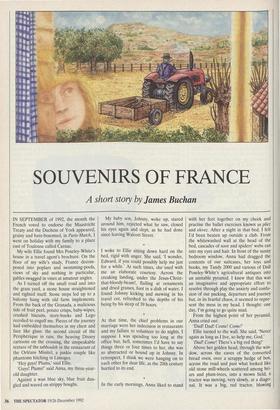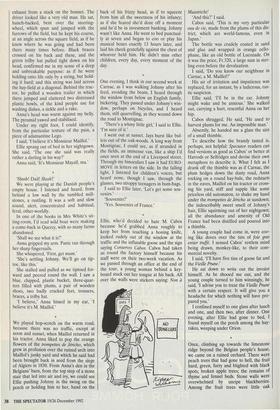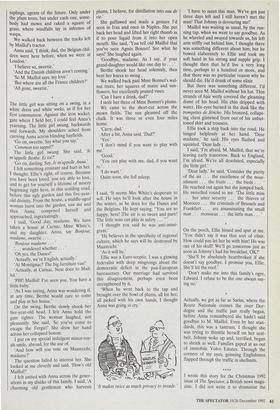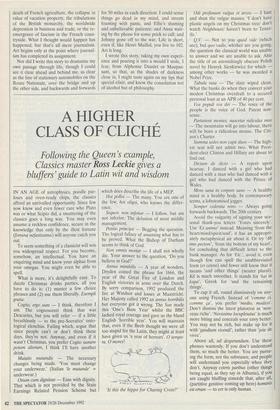SOUVENIRS OF FRANCE A short stog by James Buchan IN
SEPTEMBER of 1992, the month the French voted to endorse the Maastricht Treaty and the Duchess of York appeared, grainy and bare-bosomed, in Paris-Match, I went on holiday with my family to a place east of Toulouse called Carnac.
My wife Ellie found Mrs Poseley-White's house in a travel agent's brochure. On the floor of my wife's study, France decom- posed into poplars and swimming-pools, views of sky and nothing in particular, gables swagged in vines at amateur angles.
As I turned off the small road and into the grass yard, a stone house straightened and righted itself. Stone steps led up to a balcony hung with old farm implements. From the back of the Granada, a malicious tide of fruit peel, potato crisps, baby-wipes, crushed biscuits, story-books and Lego recoiled to engulf me. Pieces of the journey had embedded themselves in my chest and face like glass: the second circuit of the Peripherique in rain, the heaving Disney cartoons on the crossing, the unspeakable texture of the tabbouleh in the restaurant of the Orleans Minitel, a junkie couple like phantoms hitching in Limoges.
'Hey guys! Plums,' said Ellie.
'Guys! Plums!' said Anna, my three-year- old daughter.
Against a wan blue sky, blue fruit dan- gled and waved on strippy boughs. My baby son, Johnny, woke up, stared around him, rejected what he saw, closed his eyes again and slept, as he had done since leaving Walcott Street.
I woke to Ellie sitting down hard on the bed, rigid with anger. She said, 'I wonder, Edward, if you could possibly help me just for a while.' At such times, she used with me an elaborate courtesy. Across the creaking landing, under the Jesus-Christ- that-bloody-beam!, flailing at ornaments and dried grasses, foot in a dish of water, I found Johnny kicking and mewing in his travel cot, refreshed to the depths of his being by his sleep of 39 hours.
At that time, the chief problems in our marriage were her indecision in restaurants and my failure to volunteer to do nights. I suppose I was spending too long at the office but, hell, sometimes I'd have to say things three or four times to her, she was so abstracted or bound up in Johnny. In retrospect, I think we were hanging on to each other for dear life, as the 20th century hurtled to its end.
In the early mornings, Anna liked to stand
with her feet together on my cheek and practise the ballet exercises known as pliez and elevez. After a night in that bed, I felt I'd been beaten up outside a club. From the whitewashed wall at the head of the bed, cascades of soot and spiders' webs ran into my eyes and hair. In front of the sunny bedroom window, Anna had dragged the contents of our suitcases, her toys and books, my Tandy 2000 and various of Didi Poseley-White's agricultural antiques into an unstable pyramid. I knew that this was an imaginative and appropriate effort to resolve through play the anxiety and confu- sion of our packing, departure and journey but, in its fearful chaos, it seemed to repre- sent the mess in my head. I thought: one day, I'm going to go quite mad.
From the highest point of her pyramid, Anna cried out:
'Dad! Dad! Come! Come!'
Ellie turned to the wall. She said, 'Never again as long as I live, so help me, God.' Dad! Come! There's a big red thing!'
Above her golden head, through the win- dow, across the eaves of the converted bread oven, over a scrappy hedge of box, across the road and past what looked like old stone mill-wheels scattered among bri- ars and plum-trees, into a mown field, a tractor was moving, very slowly, at a diago- nal. It was a big, red tractor, blowing exhaust from a stack on the bonnet. The driver looked like a very old man. He sat, hunch-backed, bent over the steering- wheel, which spun and jumped with the furrows of the field, but he kept his course, at an angle across the square field, as if he knew where he was going and had been there many times before. Black braces crossed on his back and these, and the green trilby hat pulled tight down on his head, confirmed me in my sense of a deep and unbreakable purpose: as if he were holding onto life only by a string, but hold- ing it hard; and this string was laid across the hay-field at a diagonal. Behind the trac- tor, he pulled a wooden trailer in which there jumped and clattered two distressed plastic bowls, of the kind people use for washing dishes, a sickle and a rake. Anna's head was warm against my belly. The pyramid yawed and stabilised. Under my right foot, I could identify, from the particular texture of the pain, a piece of adamantine Lego.
I said, `I believe it's Monsieur Maillol.'
Ellie sprang out of bed in her nightgown. She said, The one she said was really rather a darling in his way?'
Anna said, 'It's Monsieur Maya11, ma.'
`Shssh! Dad! Shssh!'
We were playing at the Danish people's empty house. I listened and heard, from behind a low wall by the tumbled mill- stones, a rustling. It was a soft and slow sound, alert, concentrated and habitual, feral, other-worldly. In one of the books in Mrs White's sit- ting-room, I'd read wild boar were making a come-back in Quercy, with so many farms abandoned.
'Shall we see what it is?'
Anna gripped my arm. Panic ran through her sharp fingernails.
She whispered, `First, get mum.'
'She's settling Johnny. We'll go on tip- toe, like this.'
She stalled and pulled as we tiptoed for- ward and peered round the wall. I saw a blue, chipped, plastic bucket, three-quar- ters filled with plums, a pair of wooden shoes, two badly cracked feet, trousers, braces, a trilby hat.
'I believe,' Anna hissed in my ear, `I believe it's M. Maillol.'
We played hop-scotch on the warm road, because there was no traffic, except at noon and sunset, when Maillol returned in his tractor. Anna liked to pop the orange flowers of the trompettes de Jericho, which grew in profusion over the ruined arch into Maillol's junky yard and which he said had been brought back in seed from the siege of Algiers in 1830. From Anna's den in the Belgians' barn, from the top step of a stone stair that led into air and ivy, we could see Ellie pushing Johnny in the swing on the porch or holding him to her, hand on the back of his frizzy head, as if to squeeze from him all the sweetness of his infancy; as if she feared she'd doze off a moment and he'd be in investment banking. Johnny wasn't like Anna. He went to bed punctual- ly at seven and began to coo or play his musical boxes exactly 13 hours later, and, laid his cheek gratefully against the chest of whoever held him. He didn't miss other children, every day, every moment of the day.
One evening, I think in our second week at Carnac, as I was walking Johnny after his feed, avoiding the beam, I heard through the window from below an English family, bickering. They passed under Johnny's win- dow, perhaps on bicycles, and I heard them, still quarrelling, as they wound down the road to Montignac.
'There's a whiny little girl,' I said to Ellie. 'I'm sure of it.'
I went out at sunset. Jays burst like bul- lets out of the oak-woods. A long way from Montignac, I could see, as if stranded in the fields, an immense van, like a ship I'd once seen at the end of a Liverpool street. Through my binoculars I saw it had EURO- MOVE in letters on the side. In the falling light, I listened for children's voices, but heard none, though I saw, through the glasses, two stroppy teenagers in bum-bags. I said to Ellie later, 'Let's get some sou- venirs.'
'Souvenirs?'
`Yes. Souvenirs of France.'
Ellie, who'd decided to hate M. Cabos because he'd grabbed Anna roughly to keep her from touching a boning knife, looked rudely out of the window at the traffic and the inflatable goose and the sign saying Conserves Cabos. Cabos had taken us round the factory himself because his staff were on their two-week vacation. As we passed through an office at the end of the tour, a young woman behind a key- board stuck out her tongue at his back. All over the walls were stickers saying: Non a Maastricht!
`And this?' I said.
Cabos said, 'This is my very particular eau de vie, made from the plums of this dis- trict, which are world-famous, even in Japan.' The bottle was crudely coated in sand and glue and wrapped in orange cello- phane, like an old bottle of Lucozade. On it was the price, Fr.320, a large sum in ster- ling even before the devaluation.
I said, 'Do you know our neighbour in Carnac, a M. Maillol?'
His air of irritation and impatience was replaced, for an instant, by a ludicrous, rus- tic suspicion.
Ellie said, 'I'll be in the car. Johnny might wake and be anxious.' She walked out, carrying a hurt, resentful Anna on her hip.
Cabos shrugged. He said, 'He used to harvest plums for me. An impossible man.'
Absently, he handed me a glass the size of a small thimble.
To describe how the brandy tasted is, perhaps, not helpful: Spectator readers can find versions as good as Cabos' or better at Harrods or Selfridges and devise their own metaphors to describe it. What I felt as I drank off the thimble was as if Carnac, the plum hedges down the dusty road, Anna rocking on a round hay-bale, the redstarts in the eaves, Maillol on his tractor or cross- ing his yard, stiff and supple like some priceless old automaton, to shake my hand under the trompettes de Jericho at sundown; the indescribably sweet smell of Johnny's hair, Ellie squirming out of her nightgown; all the abundance and amenity of Old France had been distilled and poured into a thimble.
A young couple had come in, were coo- ing like doves over the tins of foie gras entier truffe. I sensed Cabos' restless mind being drawn, monkey-like, to their com- mercial novelty.
I said, 'I'll have five tins of goose fat and the Vieille Prune.'
He sat down to write out the invoice himself. As he shooed me out, and the young couple turned to him winningly, he said, 'I advise you to treat the Vieille Prune with a certain respect. It will give you a headache for which nothing will have pre- pared you.'
I confined myself to one glass after lunch and one, and then two, after dinner. One evening, after Ellie had gone to bed, I found myself on the porch among the hay- rakes, weeping under Orion.
Once, climbing up towards the limestone ridge beyond the Belgian people's house, we came on a ruined orchard. There were peach trees that had gone to hell, the fruit hard, green, furry and blighted with black spots; broken apple trees; the remains of thyme and fennel beds. Stone walls were overwhelmed by unripe blackberries. Among the fruit trees were little oak saplings, agents of the future. Only under the plum trees, but under each one, some- body had mown and raked a square of grass, where windfalls lay in infernos of wasps. We walked back between the tracks left by Maillol's tractor. Anna said, 'I think, dad, the Belgian chil- dren were here before, when we were at London.'
'I believe so, sweetie.' 'And the Danish children aren't coming.' `So M. Maillol says, my love.' 'nut where are all the France children?' 'All gone, sweetie.'
The little girl was sitting on a swing, in a white dress and white socks, as if for her first communion. Against the iron wicket, gate where I held her, I could feel Anna's yearning. The little girl swung, backwards and forwards. My shoulders ached from carrying Anna across blinding hayfields. `Go on, sweetie. Say what you say.' 'Common too tappel?' The little girl swung. She said, tIe m'appelle Berthe. Et toi?' `Go on, darling. Say, Je m'appelle Anna.' I felt something resistant and hurt in her. I thought: Ellie's right, of course. Because you have been loved, you are able to love, and to get for yourself a lifetime of misery beginning right here, in this scalding road, before this ugly garden and this five-year- old divinity. From the house, a middle-aged woman burst into the garden, saw me and then Anna, composed herself and approached, ingratiatingly. I said, 'Good day, madame. We have taken a house at Carnac, Mme White's, and my daughter, Anna, say Bonjour, madame, sweetie . . .
'Bonjour madame . . . . . . wondered whether . . . '
'Oh yes, the Danes!' 'Actually, we're English, actually.' 'At Montignac? The big furniture van!' 'Actually, at Carnac. Next door to Mail- lol.'
`Pfff! Maillol! I've seen you. You have a little baby.' 'As I was saying, Anna was wondering if, at any time, Berthe would care to come and play at her house.' On the swing, Berthe slowly shook her five-year-old head. I felt Anna hold the gate tighter. The woman laughed, not pleasantly. She said, `So you've come to escape the Fergie!' She drew her hand across her collapsed bosom.
I put on my special indulgent minor-roy- als smile, abroad, for the use of. 'And how will you vote on Maastricht, madame?'
The question failed to interest her. She looked at me cleverly and said, 'How's old Maillol?'
I felt united with Anna across the gener- ations in my dislike of this family. I said, 'A charming old gentleman who harvests plums, I believe, for distillation into eau de vie.'
She guffawed and made a gesture I'd seen in Iran and once in Naples. She put back her head and lifted her right thumb as if to pour liquid from it into her open mouth. She said, 'You tell old Maillol that you've seen Agnes Bonnet! See what he says!' She laughed again.
'Goodbye, madame. As I say, if your grand-daughter would like one day to . . . ' Berthe shook her head solemnly, then bent her knees to swing.
We walked back past Mme Bonnet's wal- nut trees, her squares of maize and sun- flowers, her excellently pruned vines.
'Can I have a drink, dad?'
I stole her three of Mme Bonnet's plums.
We came to the short-cut across the mown fields. The sun gleamed off the chalk. It was three or even four miles home.
'Carry, dad.'
After a bit, Anna said, 'Dad?'
'Yes.'
'I don't mind if you want to play with me.'
'Good.'
'You can play with me, dad, if you want to.'
'I do want.'
Quite soon, she fell asleep.
I said, 'It seems Mrs White's desperate to sell. He says he'll look after the house in the winter, as he does for the Danes and the Belgians. He kept saying, "You are so happy, here! :The air is so sweet and pure! The little miss can play in safety . . . " ' 'I thought you said he was anti-immi- grant.' 'He believes in the specificity of regional culture, which he says will be destroyed by Maastricht.'
'As it will be.'
Ellie was a Euro-sceptic. I was a glowing federalist with deep misgivings about the democratic deficit in the pan-European bureaucracy. Our marriage had survived this disagreement, perhaps even been strengthened by it.
'When he went back to the tap and brought over the bowl of plums, all for her, all picked with his own hands, I thought Anna was going to cry.'
'It makes twice as much privacy to invade.' 'I have to meet this man. We've got just three days left and I still haven't met the man! That Johnny is devouring me!'
Maillol was waiting as usual, by the run- ning tap, when we went to say goodbye. As he wheeled and swayed towards us, his left arm stiffly out behind him, I thought there was something different about him; but he bowed elaborately to Ellie and took my soft hand in his strong and supple grip. I thought then that he'd live a very long time, perhaps to a hundred or more, and that there was no particular reason why he should die. He'd drunk of some elixir.
But there was something different. I'd never seen M. Maillol without his hat. Thin strands of hair wetly covered the gleaming dome of his head. His chin dripped with water. His eyes burned in the dusk like the trompettes de Jericho. His bronzed, collaps- ing chest glistened from out of his unbut- toned shirt and trousers.
Ellie took a step back into the road. He lunged helplessly at her hand. 'Dear madame,' he said. His eyes flashed and squinted. 'Dear lady . . . '
I said, 'I'm afraid, M. Maillol, that we're leaving early tomorrow. Back to England, I'm afraid. We're all desolated, especially the little girl.'
'Dear lady,' he said. 'Consider the purity of the air . . . the excellence of the nour- ishment . . . the fruits . . . the birds . He reached out again but she jumped back. He swivelled round to me. 'The little miss . . . her utter security . . . the thieves of Morocco . . . the criminals of Brussels and Frankfurt . . . are assassinating the small man . . . monsieur . . . the little man . . . '
On the porch, Ellie hissed and spat at me. 'You didn't say it was that sort of elixir. How could you let her be with him! He was out of his skull! We'll go tomorrow just as soon as Johnny's had his breakfast, OK?'
'She'll be absolutely heartbroken if she doesn't say goodbye. I promise you, Ellie. She'll hit the roof.'
'Don't make me into this family's ogre, Edward. I refuse to be the one always say- ing no.'
Actually, we got as far as Sarlat, where the Route Nationale crosses the river Dor- dogne and the traffic jam really began, before Anna remembered she hadn't said goodbye to M. Maillol. Even by her stan- dards, this was a tantrum. I thought she was trying to throttle herself on her seat- belt. Johnny woke up and, terrified, began to shriek as well. Families gaped at us out of immobile Volvo Estates. Through the corners of my eyes, grinning Englishmen flapped through the traffic in shellsuits.
**** I wrote this story for the Christmas 1992 issue of The Spectator, a British news maga- zine. I did not write it to dramatise the death of French agriculture, the collapse in value of vacation property, the tribulations of the British monarchY, the worldwide depression in business and trade, or the re- emergence of fascism in the French coun- tryside. What I thought would happen has happened, but that's all mere journalism. Art begins only at the point where journal- ism has completed its assignment.
Nor did I write this story to dramatise my own passage through life, though I could see it clear ahead and behind me, as clear as the line of stationary automobiles on the Route Nationale, over the bridge and up the other side, and backwards and forwards for 50 miles in each direction. I could sense things go dead in my mind, and streets foaming with panic, and Ellie's shaming and unbelievable patience; and Anna wait- ing by the phone for some prick to call; and Johnny gone off to the war. Life is short, even if, like Henri Maillol, you live to 102. Art is long.
I wrote this story, taking my own experi- ence and pouring it into a mould I stole, I fear, from Alphonse Daudet or Maupas- sant, so that, as the shades of darkness close in, I might taste again on my lips that special elixir, and know the consolation not of alcohol but of philosophy.













































































































 Previous page
Previous page